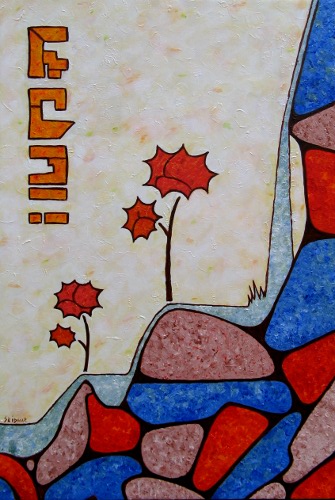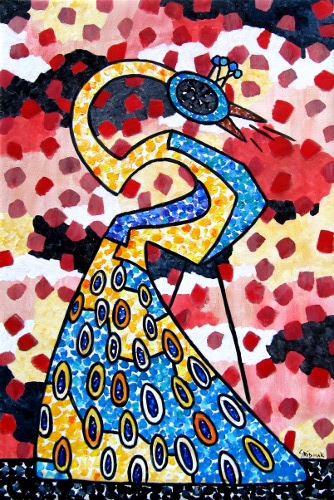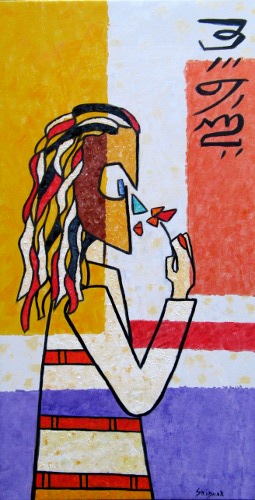HIKE DETAILS

Why Did You Hike:
Some things are so small that we miss them. Yet
others we miss because they are so big. The
hike precipitated and completed such a major
event in my life.
I had no idea why I was undertaking such an
enormous, even lunatic (by everyday
standards) endeavor. All I knew was that I
absolutely had to do it. But looking back, it
follows and falls into a distinct pattern - a
major turning point in my life.
It was the culmination of a slow process that
had begun a few years earlier and had now
come to a head and had accelerated to this
outburst.
It was a rejection of society\'s superficial
values and modes and relying more on an
inner, deeper spiritual self. A turning away
from the materialism, shallowness and
emptiness of modern life towards a more
simple, fulfilling, wholesome and balanced
life.
Every aspect of life changed as a consequence
- I moved from a financially excessive but
hollow life to a financially moderate but
full life. My taste in music and art changed
from a nihilistic to an optimistic stance -
Pink Floyd lost its place in my heart. Most
of my furniture and other "stuff" went to
Goodwill.
I started working part time instead of full
time. Cut out meat and junk food from my
diet. Started riding my bike to work. Started
meditating. Painted a lot more. Turned off
the water heater in my house. Even the way I
relate to people has changed. Now, I
naturally move towards optimistic, down to
earth types and away from the materialistic,
shallow types. Developed more faith in
myself, the world, nature and God. Turned
more spiritual.
The hike started off as an adventure but the
main journey was the one that occured inside.
I realized this about 8 months into the hike.
 The planning stages were fraught with anxiety
and nervousness - fear of the unknown and
shame of failure. But as the start drew
nearer I regained my confidence and was too
overwhelmed by the logisitics to worry about
it any more.
The planning stages were fraught with anxiety
and nervousness - fear of the unknown and
shame of failure. But as the start drew
nearer I regained my confidence and was too
overwhelmed by the logisitics to worry about
it any more.
The first 30 days or so on the trail saw the
physical adjustment phase - rapid weight
loss, increase in stamina and muscle mass,
development of endurance in the face of cold,
snow and rain, pangs of hunger and thirst.
This gave way to the mental phase, where I
came to grips with the magnitude of the task
at hand. Doubts about success or failure,
logistics, how to relate a days hike to the
full hike, how to deal with poor morale were
dealt with in this stage. This lead to a
sharper mental focus where all doubts were
slowly washed away and I had absolutely no
doubt that I would complete the hike.
Then came the spiritual part accompanied by
an increased sensitivity, openness,
creativity and soul searching. I examined
society's explicit and implicit values, the
role of an individual in a group, evolution,
survival, ethics and religion. My inner
philosophy and approach to life was cleaned
out and strengthened.
Next came a significant shift from a
helpless, victim state to one of hope and
action. Yes, one cannot change the world
alone. But that should never stop me from
changing my own actions and choices so that
they are fully aligned with my values. I
started making a list of such values, and
concrete day to day action and life style
choices that would be consistent with them to
use back in society. By this time I was in my
9th month in the wilderness. I had realized
what the hike was actually about and that the
inner journey was now complete.
Another month and I completed the physical
hike in Key West and plunged back into
society. The adjustment back in society was
much easier than I had anticipated. I found a
lot of people were feeling and suffering the
way I had. So in a deeper sense I connected
much better with people although
superficially and materialistically I shared
almost nothing in common with them.
Support:
The support for my hike consisted of
sending and recieving stuff to / from me on
the trail. It consisted of clothes,
sleeping bag and other gear - no food. My
friend Vivek handled all of it.
- Gregory Shasta internal frame backpack replaced by a Jansport external pack. The shasta weighs 7 lbs vs the 3 lbs for the Jansport.
- Sierra Designs Clip Flashlight CD tent replaced by a tarp. 3lbs vs 1 lb.
- Slumberjack Backpacker II (rated 0 - 20F) sleeping bag
- MSR dragonfly stove replaced by alcohol stove made by my brother
- MSR 22 oz fuel bottle replaced by coke bottle filled with denatured alcohol
- Poncho (doubles as ground cloth) - dropped
- Mini-Maglight flashlight - dropped
- Small Swiss army knife
- Trowel
- First aid kit - dropped
- Plastic bottles containing spices, salt and medicinal tablets - reduced to only salt
- Match box and lighter - match box dropped
- Paracord - dropped
- Compass - as required
- Maxi DEET insect repellent - as required
- Nail cutter - dropped
- Canon Sure Shot OWL camera
- Thorlo socks - these things cost 15$ a pair but are exceptionally comfortable. Replaced by ordinary socks.
- Vasque Skywalk shoes - replaced by New Balance Cross Training shoes.
- Wigwam liners - these socks are worn inside the Thorlo socks and act as a second skin. Friction is reduced to sock to sock and you get no blisters. Very effective in dry conditions. Dropped when I switched to regular shoes.
- Generic clothes and winter gear - winter gear as needed.
Weapons and Cell Phone:
 We live in more fear than is warranted. So I
had been asked the weapons and cell phone
question several times. I did not carry a gun
or cell phone.
We live in more fear than is warranted. So I
had been asked the weapons and cell phone
question several times. I did not carry a gun
or cell phone.
While being in a forest certainly carries
more risk than watching TV, I think the
dangers are way over rated. To put things
in perspective, bears run away from people
because they are hunted. They become a
problem only in high picnic / camping areas
where they have developed an association of
human beings with food. In this case, they
are after the food.
The being cut-off from civilization is also
a myth. The original old growth forests
have been destroyed a long time ago. A look
at a US map will show that on the East
Coast it is almost impossible to be more
than 2 days hike from a major road - and
this does not include the numerous dirt
roads that riddle all forests. In reality,
it is getting away from civilization that
is more difficult.
Hiking purity:
This is a very contentious issue with AT
hikers. It has all the emotion and
insolubility of religious discussions. For
non-hikers - this involves essentially the
acceptance of short-cuts or easier conditions
along the trail. Example - the official trail
may do a 10 mile meander from A to B, but
there could be a side trail from A to a
shelter C and another trail from C to B for a
total distance of 7 miles. Is it OK to do the
shorter section (This would be called blue
blazing as side trails are marked with blue
blazes)? Is it OK to ask someone else to
drive your pack from A to B while you hike
packless (it would be called slack-packing)?
Is it OK to skip entire sections? After all
not all sections are pretty (This would be
called yellow blazing because the dividers on
a road are yellow). Is it OK to take a long
break from your hike and then come back and
if so how long ?
It is however recommended that prospective
thru hikers write a contract with
themselves before the hike, to avoid the
slippery slope of liberty taking. My
contract was:
- Safety first.
- No slackpacking.
- On the AT from Katahdin to Springer, no blue / yellow blazing.
- On all other trails blue blazing, road walks and off trail hiking acceptable with full pack.
- More than a week off trail only in cases of emergency.
- If off the trail for more than 3 days switch back to vegetarianism.
- In any break (food, days off etc) the hike continues from the point suspended or upstream.
Towards the end of the hike I had realized
that the rules are meaningless if one knows
what the journey is really about. But if
not followed the journey is lost. Sort of a
catch-20.


